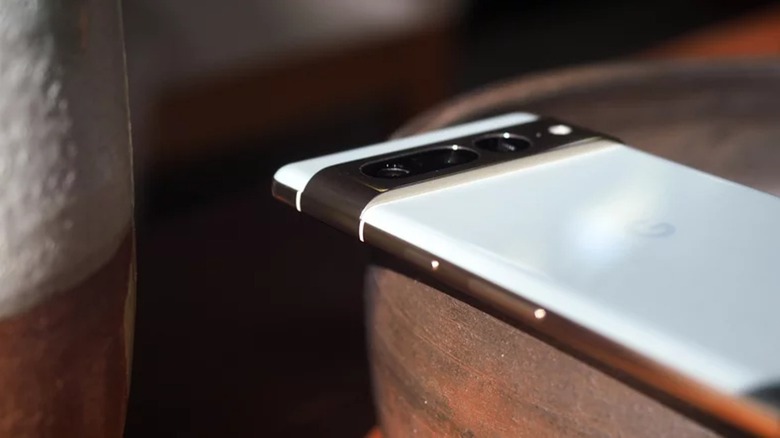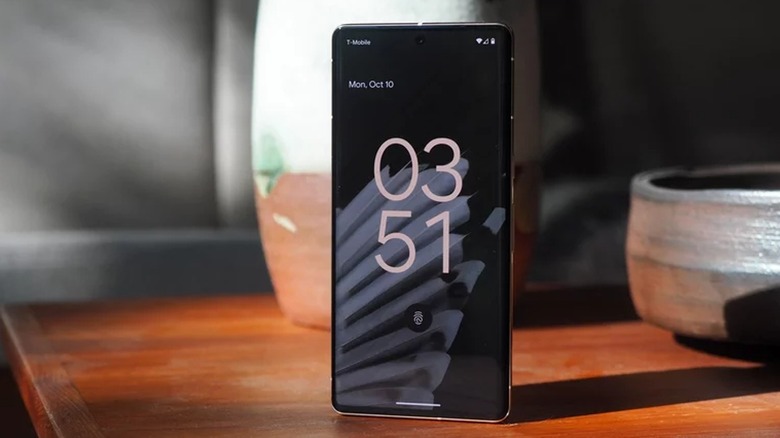Can Your Google Pixel Get A Virus From Chrome? Here's What We Know
The Pixel phone is one of Google's flagship products, and the Pixel 7 Pro in particular is a showcase for bleeding-edge device security. The Pixel 7 comes equipped with fingerprint locks and facial recognition to protect access. The model likewise ships with an onboard VPN to protect saved data and ID information. Google is also addressing arguably the trickiest, least solvable problem in data security — namely that if your solution is the slightest bit inconvenient, people won't use it – with a user-friendly security hub, which will debut for free as part of an Android OS update in late 2022.
Unfortunately, no suite of solutions is ever 100% effective. Bad actors exist and the financial incentives for powerful hacks are simply too significant for ne'er-do-wells to ignore. Thankfully, there are equal incentives for service providers to maintain top-quality security from day one. The Pixel 7 smartphones may not be impervious to security threats, but users aren't left helpless in the face of online risks.
The Pixel can get viruses like any other Android phone
Browsers are usually ground zero when it comes to infection with malware, adware, and viruses. Of note, the word virus is a catchall term for an unwanted program that installs itself on a system and propagates, causing any number of negative effects. Malware refers to viral programs that are specifically designed to damage or disrupt a system, while adware is the subset of malware that spams unwanted advertisements.
Like every browser, Google Chrome can be exposed to viruses during the course of normal use. Usually, the browser fends off the infection itself. No data security is perfect, however, and sometimes Chrome falls foul of an unwelcome program it can't handle with its onboard defenses. These viruses compromise browser security and carry the risk of spreading beyond Chrome to the device it's installed on, Android phones such as Pixel included.
A new Pixel smartphone sold in the U.S. comes with 5 years of security updates (via Google). Every update provides new, more effective security solutions. As such, right now the Pixel 7 is the last word in data security, at least when it comes to Android phones. As long as bad people have incentives to do sketchy things, however, it will always be possible to get a virus on a Pixel handset.
There are ways to protect and clean a Pixel smartphone
That's where prevention and user security tools come in. With the Pixel 7 series, Google is including its first onboard VPN, which is a tool that provides an encrypted connection to the internet; no smartphone should be without one. As well, the Google Play Store where Android users get most of their apps has a Play Protect setting that keeps users from downloading suspicious software. On its support website, Google advises Android users — that includes Pixel owners — to turn on Play Protect as one of the multiple methods for protecting their phones from malicious software. Pixel users should also avoid sideloading APKs, which refers to installing apps downloaded outside of the Play Store.
Android also includes several ways to purge a phone of unwanted or malicious programs. For example, pressing and holding the power button allows users to restart the phone in Safe Mode, after which point it should be simple to uninstall unwanted apps. Reverting the phone to factory defaults will purge unwelcome programs, too — though doing so also deletes data from the phone, so be sure to back up vital info beforehand. Other fixes also exist for stubborn malware. While no system connected to the internet can ever be 100% safe, knowing a few simple strategies and browsing with care should keep most Pixel users safe.


